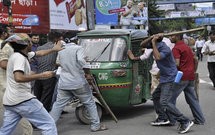 Democracy does not have to be a blood sport; it can be an honourable enterprise that advances the public interest.” So said a former US president; but that is not so in Bangladesh. Here the demos in the demos-kratos have gone missing. What we have seen in the last one month can be termed as demos-aima, people's blood rather than people's rule. Some scholars have argued that in some respects democracy is violence-driven. We don't have to go far to fetch examples of it from outside our country.
Democracy does not have to be a blood sport; it can be an honourable enterprise that advances the public interest.” So said a former US president; but that is not so in Bangladesh. Here the demos in the demos-kratos have gone missing. What we have seen in the last one month can be termed as demos-aima, people's blood rather than people's rule. Some scholars have argued that in some respects democracy is violence-driven. We don't have to go far to fetch examples of it from outside our country.
The moot question is, how does one characterise what we are seeing today in the name of political programmes like blockade?
It is not as if such instances of violent acts did not occur in this country in the past. But the intensity of current violence has far surpassed those of the past and the casualty figures have gone up manifold. Soft targets, particularly civilians, are being made objects of attacks. And to say that these are the work of government agents cannot wash with the public.
Neither Bangladesh, nor for that matter the subcontinent that we were once an integral part of, is new to political violence. Violence was an instrument to compel the colonial power to relinquish authority. It was meant to terrorise the British and the targets were the rulers and their establishments and cohorts that helped perpetuate British rule in India. But these were random rather than widespread in nature. However, it was not violence in the ultimate analysis that forced the British to leave the country, but a more powerful weapon of non-violence.
It is quite another matter that the revolutionary nationalists did not succeed, and that India's independence did not come as a result of an armed revolutionary movement. The credit for that is only Bangladesh's where freedom came after an armed struggle. Even during the months proceeding March of 1971 it was never the people or public property that was targeted as a part of the movement.
The government's quandary as to how to address the current situation is exposed by the comments of some ministers, who referred to the Naxals. It came in the context of the government efforts to end the spate of current violence citing the example of the Naxalites being put down by force by the Indian security forces. The Naxals, who were Maoists, were crushed in 1971, but their ideology survives in other parts of eastern India that feed on Maoist ideology. And Maoists are acknowledged as greater threat to India than the Islamic extremists. Their political demands still hold good.
It would be misplaced to compare BNP with the Naxals and draw the success of the Indian security forces in order to devise similar course of action to address the current situation by force alone. The comparison, nonetheless, betrays AL's intention to equate the BNP with militant or extremist groups, and project it as such. AL's cause to some extent is beefed up by the fact that BNP's major partner Jamaat is seen as the main perpetrator of violence, which is disposed towards hostility with little at stake for it in the safety of the people. And one cannot be faulted for seeing the current method employed to wreak violence as mimicking the tactic of insurgent groups.
The aim of an insurgent group is to inculcate fear through terror among the populace, and expose the inability of the government to provide security to the public. The targets are soft and are randomly selected in the initial phase, just like what we have seen in the last one month where public transports have been attacked with petrol bombs, a handy weapon of arsonists. And the attacks were mostly carried out at night using hit and run tactic.
It is hard to say who is in charge of the BNP these days. But its policymakers must immediately order its activists to stop the violence if it wants to retain any degree of public support to its cause. They must understand that violence will detract the validity of BNP's political demands. However, it would be wrong to think that that will provide political mileage to the AL. The more the public sufferings the more the public opinion will go against the BNP. But that does not necessarily mean that it will go in favour of the AL. Failure to stem this will only sap public trust in the government, but at the same time a carte blanche 'shoot at sight' is not the answer.
To me the current state seems to be a cruel manifestation of political violence, where terror tactics is being used to attain a bargaining position. The matter is compounded by an impervious government. And where might this lead to? Let us leave that for next week.
By Special Arrangement with : South Asia Monitor (http://www.southasiamonitor.org)